
Charles Ives' song legacy presents a unique set of challenges to
its interpreters. Ives' songs derive from an enormously wide variety of
musical traditions, from the German lied tradition (and European art song
in general), to American parlor songs, hymns, and folk tunes. In addition,
Ives' own relentless experimentation, which often bore little resemblance
to anything that preceded him, led to a body of works that still
presents formidable obstacles to any performer, regardless of their background.
In short, how many singers are capable of singing like Dietrich Fischer-Dieskau
one moment and an authentic Texas cowboy the next? What's even more difficult:
Ives' greatest songs typically don't come from any clearly defined
performance tradition, so the performer must internalize them and come
up with something new, a kind of Ivesian cultural synthesis encompassing
almost everything: high and low, new and old, secular and sacred, comical
and serious, American and Universal.
Aside from stylistic variety, Ives' songs also call for an enormous range of emotional responses: from mystical meditations on God and Nature to sentimental recollections of days gone by; from sarcastic, bombastic political commentary to the innocent, wide-eyed wonder of a child. The songs' broad emotional spectrum presents yet another challenge to any artist who chooses to perform them.
It would be foolish to assume that there is one person who is capable of realizing all of Ives' songs to their fullest potential. Fortunately for us today, many singers have chosen take up the challenges and rewards of these works. I recommend that you listen to many different recordings of the songs. It is an enriching, fascinating experience to hear them performed by different artists, each with his or her own abilities and insights about the music. And, in the hands of a sympathetic interpreter, these songs pack the cosmic wallop all great art; they move us and change us and help us to see everyday things in a whole new light.
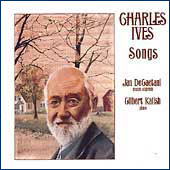 Jan
DeGaetani (mezzo-soprano) & Gilbert Kalish (piano) / "Charles
Ives Songs" [17 songs] (Nonesuch 9 71325-2)
Jan
DeGaetani (mezzo-soprano) & Gilbert Kalish (piano) / "Charles
Ives Songs" [17 songs] (Nonesuch 9 71325-2)
This is my favorite recording of Ives' songs. It really is a stunning disc in every way. DeGaetani has a completely idiomatic command of Ives' musical language, and she makes the "impossible" songs sound effortless, even natural. She also has a special way with the strange, otherworldly elements in Ives' music, and she taps into these qualities in his music more convincingly than anyone else. Moreover, Kalish's support is phenomenal. This recording is an excellent introduction to Ives' songs because it demonstrates the broad range of musical styles that Ives employed in the genre, from sentimental remembrances ("The Things Our Fathers Loved") to leaping dissonances ("The Majority"). DeGaetani also marvelously sings my two of very favorite Ives songs on this disc: "The Housatonic at Stockbridge" and "Serenity." This one rates as high as they get.
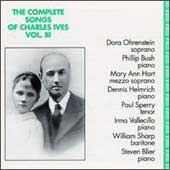 Dora
Ohrenstein (soprano) & Phillip Bush (piano); Mary Anne Hart (mezzo-soprano)
& Dennis Helmrich (piano); Paul Sperry (tenor) & Irma Vallecillo
(piano); William Sharp (baritone) & Stephen Blier (piano) / "Complete
Songs of Charles Ives, Vol. 3" [36 songs] (Albany 079)
Dora
Ohrenstein (soprano) & Phillip Bush (piano); Mary Anne Hart (mezzo-soprano)
& Dennis Helmrich (piano); Paul Sperry (tenor) & Irma Vallecillo
(piano); William Sharp (baritone) & Stephen Blier (piano) / "Complete
Songs of Charles Ives, Vol. 3" [36 songs] (Albany 079)
Volume 3 of Albany's "Complete Songs of Charles Ives" is another outstanding recording of Ives' songs. This disc (and volume 4) collect the songs of Ives' maturity, and consequently these two discs contain most of Ives' greatest songs. The disc (and the entire set) benefits from having the variety that comes with four singers, all of whom are excellent. A few remarks about the singers and songs: William Sharp's version of Ives' masterpiece "General Booth Enters into Heaven" is jarring, earthy, passionate, and transcendent--just like it should be. I'm completely convinced by it. Sharp's is my very favorite version of this song, by any singer. Sharp is also outstanding in "Tom Sails Away," which to my ears is one of Ives' greatest songs. Mary Ann Hart's versions of "The Children's Hour" and "Walking" immediately caught my ear. What a lovely voice! And she sounds completely at home in Ives' sound world as well. I thought Dora Ohrenstein was at her best in some of Ives' thorniest songs, especially "A Farewell to the Land." She managed to make it and others like it sound both natural and strange, a characteristic of the best Ives interpreters. Lastly, Paul Sperry is fantastic. His instrument may not be the most powerful or lustrous, but he's completely inside the songs--especially the "tough" ones, so he's totally convincing. Check out his version of "Vote for Names" and "Charlie Rutlage." He's not afraid to belt it out! No pussy-footing around here! I think Ives would have loved it! If you're looking to explore Ives' songs, you can't wrong with this set. If you're a fan, you'll want all four volumes in this series. If you're just beginning to explore Ives songs, start here.
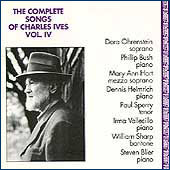 Dora
Ohrenstein (soprano) & Phillip Bush (piano); Mary Anne Hart (mezzo-soprano)
& Dennis Helmrich (piano); Paul Sperry (tenor) & Irma Vallecillo
(piano); William Sharp (baritone) & Stephen Blier (piano) / "Complete
Songs of Charles Ives, Vol. 4" [42 songs] (Albany 080)
Dora
Ohrenstein (soprano) & Phillip Bush (piano); Mary Anne Hart (mezzo-soprano)
& Dennis Helmrich (piano); Paul Sperry (tenor) & Irma Vallecillo
(piano); William Sharp (baritone) & Stephen Blier (piano) / "Complete
Songs of Charles Ives, Vol. 4" [42 songs] (Albany 080)
Volume 4 in the Albany set is another excellent choice. All of the songs on this disc date from the latter part of Ives' composing years. The earliest is dated 1915 ("Thoreau"); all but seven songs are from the years 1919 to 1921. For me, one of the highlights of the set is the first song, "The Innate," performed by William Sharp. It is a beautiful, spirtual song. (Oddly, the text in the booklet doesn't quite match the words of the singer.) Sharp is also particularly noteworthy for his interpretations of "Thoreau," "Cradle Song," "At Sea," and "Ann Street." Mary Ann Hart has a stunningly beautiful mezzo voice and her version of "Grantchester" will knock you out. I'd never heard this before, and it's an astounding song--great interpretation and piano playing too. She also gives DeGaetani a run for her money in "Serenity." (Both are beautiful, but I have to give my final nod to the Nonesuch disc--if only for Kalish's piano playing in the final moments of the song.) Hart is also exceptional "From the 'Incantation'," "The Housatonic at Stockbridge," "The Majority" (great, and much quicker than DeGaetani: 5.04 compared to 6.45!), and the disc's stirring closer, "In the Mornin'." Dora Ohrenstein takes on the tough "West London" and she makes it sound completely natural and compelling. She makes Ives' "Hymn" sound mystical and otherworldly--but also familiar at the same time. There's a dream-like quality to the song, and Phillip Bush's piano playing is noteworthy. Ohrenstein is also wonderful in "Disclosure," "Yellow Leaves," "The One Way," and "A Sea Dirge." In general, I think Ohrenstein is at her best in Ives' most "out there" songs. What a lion tamer! And the same could be said for Paul Sperry. As with Volume 3, he's a great "acting singer." He just makes these songs completely convincing music because he's willing to go to the extremes that Ives sometimes asks for. Listen to "The Indians." This is a risky interpretation. It's slow, slow, slow. But it works. Other songs that Sperry excels in include "An Election" and "The Greatest Man." [Sperry and Roberta Alexander (see below) are my favorite singers for this song.] This is required listening for fans of Ives (and fans of art song in general).
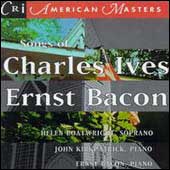 Helen
Boatwright (soprano) & John Kirkpatrick (piano) [24 songs]
(CRI 675, coupled with songs by Ernst Bacon, out of print)
Helen
Boatwright (soprano) & John Kirkpatrick (piano) [24 songs]
(CRI 675, coupled with songs by Ernst Bacon, out of print)
Boatwright's and Kirkpatrick's pioneering LP of Ives' songs was released originally on the Overtone label in 1954. And even though these recordings are now over fifty years old, they are just as convincing as ever. Both of these artist are completely at home with Ives' songs. Boatwright's singing is unforced and natural. Even when she's gazing inward, her singing never seems arty or self-conscious. Boatwright is enormously impressive in songs like "Abide with Me" (which opens the disc), "Shall We Gather at the River," and "Evening." Not surprisingly, Kirkpatrick's contributions are inspired too. For example, listen to his piano playing on "The Swimmers." It's superb. This is an auspicious recital that every Ives fan should hear. (Hopefully, New World will re-issue these recordings soon, since they recently acquired the CRI catalog.)
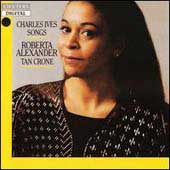 Roberta
Alexander (soprano) & Tan Crone (piano) / "Charles Ives Songs"
[26 songs] (Etcetera KTC1020, out of print in the U.S.A.)
Roberta
Alexander (soprano) & Tan Crone (piano) / "Charles Ives Songs"
[26 songs] (Etcetera KTC1020, out of print in the U.S.A.)
Alexander has a stunning vocal instrument, and I think she's most impressive in elegiac songs like "Tom Sails Away" and "Autumn." Pianist Tan Crone, who is exceptional throughout recital, is especially lovely in the latter song, bringing out a tenderness and naturalness that are absent in others. If Alexander occasionally seems the slightest bit unidiomatic, it's easy to forgive her, because she makes up for it with risk-taking and bravado, and you can sense her complete commitment. Check out her reading of "The Housatonic at Stockbridge," which I find a shade better than DeGaetani's. Unbelievably (and criminally!), this disc appears to be out of print in the United States. Nevertheless, it's easy enough to pick up a copy from an online retailer in the U.K. Alexander and Crone have recorded a second volume of Ives' songs. See the review below.
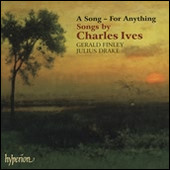 Gerald
Finley (baritone) & Julius Drake (piano) / "A Song - For Anything;
Songs by Charles Ives" [31 songs] (Hyperion CDA67516)
Gerald
Finley (baritone) & Julius Drake (piano) / "A Song - For Anything;
Songs by Charles Ives" [31 songs] (Hyperion CDA67516)
Gerald Finley possesses a manly yet vulnerable baritone voice that's quite remarkable. Pianist Julius Drake is a much-lauded accompanist. They have recorded an impressive recital of Ives' songs. Some of the most effective songs are the foreign language pieces. For the most part, these songs are more traditional than Ives' other works; most of them were composed in his early years. Even so, these songs are so wonderfully performed that I found myself having a new appreciation for their vitality. The first song in the recital, "Feldeinskameit," sets the tone for much of the set. It is deliciously inward and hefty, very much in the German lied tradition. There is a prevailing sense of loss and melancholy, and the same could be said of all of the German language pieces. They may not be Ives' most original works, but I have never heard them performed so convincingly. The same could also be said of "Élégie," a French language work. It's shockingly beautiful, a great performance. This is a work to pull out when anyone claims that Ives was incapable of writing beautiful, traditional music. This is intoxicating, and I can't imagine anyone doing it better.
The more traditional English language songs are also perfectly realized. In songs like "Berceuse" and "Remembrance" Finley's velvety baritone and Drake's limpid pianism lead to very memorable performances. The duo interprets many songs using a more meditative approach than I have heard before, and the results are usually compelling. For instance, you might compare Finley and Drake's performance of "The Things Our Fathers Loved" with Thomas Stewart and Alan Mandel's. Stewart is more sentimental, less heavy, whereas Finley's performance is characterized by a greater sense of loss. It's more elegiac. Both performances are convincing, even if they are different.
I must say that I find the less traditional songs from Ives' mature period to be more of a mixed bag. Some of them are wholly successful. For example, I think Finley's performance of "The Housatonic at Stockbridge" is outstanding, even if doesn't culminate with the same degree of ecstatic abandon as some others. "Tom Sails Away" is also excellent. Finley does a superb job of portraying the protagonist's recollected memories, almost as if he is whispering them to himself. Their performance of "West London" is also very fine. I should make special mention of Finley's singing in this difficult song; the lead-in is breath-taking. I think the less successful songs don't work for several reasons. Often, Julius Drake's piano seems less rhythmic and less dynamic than it should be. For example, in "General Booth Enters into Heaven," the pianist's playing has a measured quality where there should be ecstatic abandon. Finley's singing is excellent (despite a bit of over-enunciating), but the work is undermined by Drake's restraint. Also, sometimes the works just don't sound "American" enough. This might be a matter of accents (as in "Charlie Rutlage," where Finley's southern accent isn't convincing) or a matter of holding back where other interpreters belt it out.
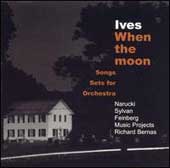 Susan
Narucki (soprano), Sanford Sylvan (baritone) & Alan Feinberg (piano)
/ "When the Moon" [16 songs] (Decca 466 841-2, coupled
with Sets for Small Orchestra
and Set for Theatre Orchestra)
Susan
Narucki (soprano), Sanford Sylvan (baritone) & Alan Feinberg (piano)
/ "When the Moon" [16 songs] (Decca 466 841-2, coupled
with Sets for Small Orchestra
and Set for Theatre Orchestra)
This wonderful disc consists of short orchestral works, arranged as "Sets for Small Orchestra," followed by the same works in their art song form. Of the sixteen songs on the disc, seven are performed by Narucki and nine are performed by Sylvan. (Pianist Alan Feinberg accompanies them both.) Most of the songs are extremely short. In fact, only three crack the 2 minute mark. Despite their brevity, Narucki and Sylvan make the most of these works, turning in strong performances. Narucki, in particular, has striking vocal control. Her performances of "The 'Incantation'" and "Like a Sick Eagle" are especially fine. In the latter song she conveys the eagle's grand vistas and as well as a palpable sense of dread. She is completely attuned to Ives' otherworldly, mysterious sounds. I'd also like to make special note of Sylvan's performance of "Evening." Again, the performers make this difficult song sound natural and unforced. Outstanding.
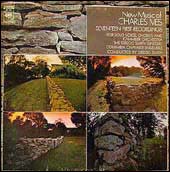 Gregg
Smith (conductor), The Gregg Smith Singers, the Columbia Chamber Ensemble
/ "New Music of Charles Ives: Seventeen First Recordings" [9 orchestral
songs] (Columbia MS 7321, out of print LP) This LP includes:
Gregg
Smith (conductor), The Gregg Smith Singers, the Columbia Chamber Ensemble
/ "New Music of Charles Ives: Seventeen First Recordings" [9 orchestral
songs] (Columbia MS 7321, out of print LP) This LP includes:
- Several Psalm setting and other works for chorus
- "The Last Reader" (Adrienne Albert, mezzo-soprano)
- "Luck and Work" (William Feuerstein, baritone)
- "Like a Sick Eagle" (Adrienne Albert, mezzo-soprano)
- "Tolerance" (William Feuerstein, baritone)
- "From the Incantation" (Adrienne Albert, mezzo-soprano)
- "The Pond" (Adrienne Albert, mezzo-soprano)
- "At Sea" (William Feuerstein, baritone)
- "The Children's Hour" (Adrienne Albert, mezzo-soprano)
- "The Rainbow" (William Feuerstein, baritone)
Most of this album is dedicated to Ives' choral works (click here for details), but the LP closes out with nine of Ives' songs. However, rather than just piano accompaniment, singers Adrienne Albert and William Feuerstein are accompanied by the Columbia Chamber Ensemble. The four songs by Feuerstein are solid. I like them very much. But the songs by Adrienne Albert are magical. She has a clear-toned, uncomplicated (in the best sense) voice, almost like a folk singer's. But I don't know of any folk singer who could take on the thorny challenge of a song like "Like a Sick Eagle" and make it sound so supremely musical--and natural. And each of the other four songs that she takes on are equally compelling. My favorite of all is "The Children's Hour." This is the only song that uses just piano accompaniment, and the unstudied nostalgia of the work comes across perfectly. If only this singer had taken on more than five of Ives' songs!
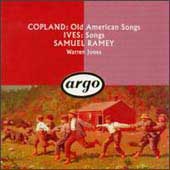 Samuel
Ramey (bass) & Warren Jones (piano) [10 songs] (Argo 433 027-2ZH,
coupled with Copland's "Old American Songs," Sets 1 and 2, out of print)
Samuel
Ramey (bass) & Warren Jones (piano) [10 songs] (Argo 433 027-2ZH,
coupled with Copland's "Old American Songs," Sets 1 and 2, out of print)
Ramey takes on ten of Ives songs in this recital. For me, the highlights are his swaggering version of the cowboy ballad "Charlie Rutlage"--Ramey's is my favorite version of this song--and his tender reading of "The Children's Hour," Ives's setting of a Longfellow's verse. Sadly, this one is out-of-print, but it's worth looking for. The Copland is fun too. My kids and I love "I Bought Me a Goose." You probably will too.
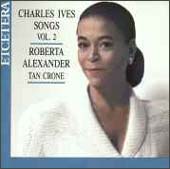 Roberta
Alexander (soprano) & Tan Crone (piano) / "Charles Ives Songs,
Volume 2" [28 songs] (Etcetera KTC1068, out of print in the
U.S.A.)
Roberta
Alexander (soprano) & Tan Crone (piano) / "Charles Ives Songs,
Volume 2" [28 songs] (Etcetera KTC1068, out of print in the
U.S.A.)
Surely this is one of the most sheerly beautiful Ives recitals ever recorded. Alexander has a wonderful vocal instrument, and her second volume focuses on many of Ives' more traditional, European-sounding art songs. For example, "Feldeinsamkeit" has never sounded better than it does here. And Tan Crone again offers immaculate, effortless accompaniment. This is a perfect disc to give your friends who think Ives was incapable of writing delicate, melodious compositions. How wrong they are!
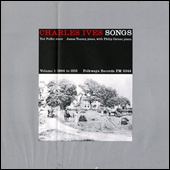 Ted
Puffer (tenor) & James Tenney (piano) / "Charles Ives Songs,
Vol. 1: 1894-1915" [14 songs] (Folkways FW03344; available
online at www.smithsonianglobalsound.org)
Ted
Puffer (tenor) & James Tenney (piano) / "Charles Ives Songs,
Vol. 1: 1894-1915" [14 songs] (Folkways FW03344; available
online at www.smithsonianglobalsound.org)
Volume 1 in Puffer and Tenny's rectial of Ives' songs opens with a wonderful version of "General Booth." The first thing I noticed was the timbre of Puffer's voice. Rather than the baritone that I normally associate with this song, Puffer's voice is a clear and light tenor. I love how Puffer interprets the work. It's not an especially emphatic approach, and at first I thought it might be too understated. But after listening all the way through, I was convinced. This is a novel, thoroughly convincing performance of one of Ives' greatest songs. When the song reaches it's grand climax, just before the final crescendo, it's easy to picture General Booth ascending to the sky through parted clouds. The remaining songs are equally well done. This is a recital that will impress you more and more with repeated listenings.
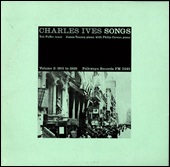 Ted
Puffer (tenor) & James Tenney (piano) / "Charles Ives Songs,
Vol. 2: 1915-1925" [19 songs] (Folkways FW03345; available
online at www.smithsonianglobalsound.org)
Ted
Puffer (tenor) & James Tenney (piano) / "Charles Ives Songs,
Vol. 2: 1915-1925" [19 songs] (Folkways FW03345; available
online at www.smithsonianglobalsound.org)
Puffer and Tenny's second volume of Ives' songs is just as impressive as their first. Once again, their approach is generally understated, even though many of these songs are Ives at his most outré. Listen carefully to their reading of "On the Antipodes"--surely one of Ives' toughest songs. The singer and pianist hold nothing back, and it's an amazing performance. Another thorny song, "An Election," is nearly as effective. Just listen to Puffer's singing in the closing bars. Puffer doesn't shortchange any of the more introspective songs either. His readings of "Tom Sails Away" and "Serenity" are also required listening. These recordings (both volumes 1 and 2) were made in 1965, and they are no longer commercially available except through the Smithsonian website. You can download individual songs or order the complete albums in CD format. If you're a fan of Ives' songs, you'll probably want to hear them all.
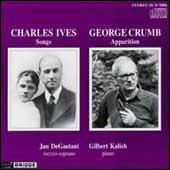 Jan
DeGaetani (mezzo-soprano) & Gilbert Kalish (piano); "Songs"
[9 songs] (Bridge 9006, coupled with Crumb's "Apparition")
Jan
DeGaetani (mezzo-soprano) & Gilbert Kalish (piano); "Songs"
[9 songs] (Bridge 9006, coupled with Crumb's "Apparition")
This recital by DeGaetani and Kalish contains nine lovely Ives songs. Again, DeGaetani sounds completely at home in Ives' world, and her luxurious, otherworldly voice is especially effective in "Tom Sails Away" and "West London." Taken as a whole, however, these songs seem to lack the wallop of the Nonesuch recording. That may be because the real centerpiece of this disc seems to be George Crumbs haunting and haunted song cycle "Apparition," which was written for these performers. In any case, any of Ives' works performed by DeGaetani and Kalish are essential.
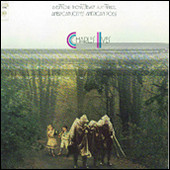 Evelyn
Lear (soprano), Thomas Stewart (baritone) & Alan Mandel (piano) /
"American Scenes, American Poets" [24 songs] (Columbia
Masterworks M-30229, out of print LP)
Evelyn
Lear (soprano), Thomas Stewart (baritone) & Alan Mandel (piano) /
"American Scenes, American Poets" [24 songs] (Columbia
Masterworks M-30229, out of print LP)
I heard this LP for the first time recently, and I've really enjoyed it. The whole record has an uplifting, smiling quality. Both Stewart and Lear sound as if they're having a ball singing these songs, and Mandel's accompaniment is completely in synch with them. For me, the highlight of the album is Thomas Stewart's take on "Charlie Rutlage." He actually sounds like a cowboy, with a laconic drawl that is right on the mark. I love how he "narrates" portions of the song, rather than singing the words. This performance sounds more realistic, more convincing than any other version I've heard. Other songs worth noting: Stewart's take on "The Things Our Fathers Loved" strikes a perfect balance between present-day reverie and past-day sentiment, and his version of "The Greatest Man" also features a wonderful, entirely believable child-voice--without being at all cloying. Evelyn Lear is also impressive. I like her versions of "Tom Sails Away" and "Two Little Flowers." This is yet another recording that Sony should reissue, as it has never been issued on compact disc.
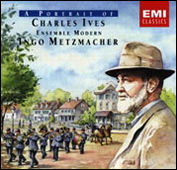 Henry
Herford (baritone) & Ingo Metzmacher (conductor) / Ensemble Modern
/ "A Portrait of Charles Ives" [4 songs plus 1 choral
work featuring Herford] (EMI CDC7 54552-2, out-of-print)
Henry
Herford (baritone) & Ingo Metzmacher (conductor) / Ensemble Modern
/ "A Portrait of Charles Ives" [4 songs plus 1 choral
work featuring Herford] (EMI CDC7 54552-2, out-of-print)
This recording includes:
- General Booth Enters Into Heaven
- On the Antipodes
- Aeschylus and Sophocles
- Sunrise
- The Bells of Yale (with chorus)
- Selections from the Sets for Small Orchestra
- The Set for Theatre Orchestra
- Other orchestral works
These five songs by bartione Henry Herford are interspersed throughout this very compelling collection of shorter Ives' works. For the most part, I prefer his singing here to his recitals on Unicorn-Kanchana (oop). For example, I think that this version of "General Booth" is excellent, surpassing many others'. This may be partly due to Ingo Metzmacher's superb conducting. All of the songs feature smallish ensembles rather than just a pianist, and these arrangements are interesting and illuminating. (Incidentally, this recording is the only version of the "General Booth" that features instrumental forces beyond a piano without choral accompaniment.) I was also captivated by Herford's performance of "Sunrise," Ives' final composition. All of the performers do a fine job of conveying the works haunting strangeness. Unfortunately, this CD is out of print. EMI should reissue it. In the meantime, keep your eyes open for a used copy.
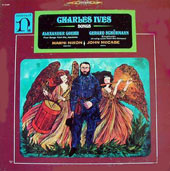 Marni
Nixon (soprano) & John McCabe (piano) [13 songs] (Nonesuch
H-71209, coupled with works by Goehr and Schurmann, out of print LP)
Marni
Nixon (soprano) & John McCabe (piano) [13 songs] (Nonesuch
H-71209, coupled with works by Goehr and Schurmann, out of print LP)
Nixon’s voice is like a hummingbird, artless and vivid. Even more, these songs benefit from singing by an artist who is a fine actor. At her best, Nixon convinces you that the action of the song is really going on, just so. But it’s not done in a high-art, opera singer sort of way. Listen to “The Greatest Man,” and you’ll be convinced that you’re hearing a child singing about her father. There’s nothing cloying about it; it’s completely unaffected. In “A Christmas Carol,” Nixon’s singing seems so heartfelt that it reminds me of the way a mother might sing a lullaby. Songs like “At the River” and “Ann Street” and “The Side Show” are all equally remarkable for their directness. Other songs don’t come off as well as these. Nixon’s faux-Southern accent in “Charlie Rutlage” occasionally veers off-track into something that sounds more English than Texan, as if Julie Andrews had momentarily become a cowboy. And other songs seem to lack gravity. For example, Nixon’s “West London” seems lightweight somehow. Even “General Booth,” which benefits from some terrific vocal characterizations, seems to lacks the cumulative wallop of the best versions. (It might just be the simple fact that certain songs call for a heftier voice. And for all of the positive qualities of Nixon’s voice, “hefty” is not one of them.) Ives’ songs are so diverse that there’s no one singer who can do full justice to all them--or even most of them. I’ve never heard anyone sing these songs quite like Marni Nixon does. This is a unique record, one well worth tracking down.
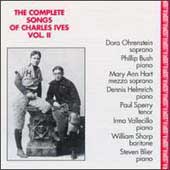 Dora
Ohrenstein (soprano) & Phillip Bush (piano); Mary Anne Hart (mezzo-soprano)
& Dennis Helmrich (piano); Paul Sperry (tenor) & Irma Vallecillo
(piano); William Sharp (baritone) & Stephen Blier (piano) / "Complete
Songs of Charles Ives, Vol. 2" [39 songs] (Albany 078)
Dora
Ohrenstein (soprano) & Phillip Bush (piano); Mary Anne Hart (mezzo-soprano)
& Dennis Helmrich (piano); Paul Sperry (tenor) & Irma Vallecillo
(piano); William Sharp (baritone) & Stephen Blier (piano) / "Complete
Songs of Charles Ives, Vol. 2" [39 songs] (Albany 078)
Volume 2 in the Albany Complete Song cycle is hardly less impressive than Volumes 3 and 4 listed above. The only factor that makes those volumes slightly preferable is that they capture Ives at his creative peak, whereas the music on this disc (and on Volume 1) represent Ives' more conventional music, prior to his full creative maturation. In fact, with a few exceptions, all of the music on Volume 2 was composed prior to 1902. Even so, this disc is required listening for ardent Ives fans. It wasn't until I'd heard these discs and listened to Ives' songs in (roughly) chronological order that I got a full sense of the place of art songs in Ives' creative output.
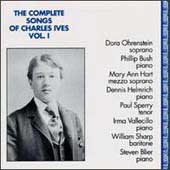 Dora
Ohrenstein (soprano) & Phillip Bush (piano); Mary Anne Hart (mezzo-soprano)
& Dennis Helmrich (piano); Paul Sperry (tenor) & Irma Vallecillo
(piano); William Sharp (baritone) & Stephen Blier (piano) / "Complete
Songs of Charles Ives, Vol. 1" [36 songs] (Albany 077)
Dora
Ohrenstein (soprano) & Phillip Bush (piano); Mary Anne Hart (mezzo-soprano)
& Dennis Helmrich (piano); Paul Sperry (tenor) & Irma Vallecillo
(piano); William Sharp (baritone) & Stephen Blier (piano) / "Complete
Songs of Charles Ives, Vol. 1" [36 songs] (Albany 077)
It's interesting and instructive to hear Ives' first songs, which were largely his first compositions of any kind, even if they are not the masterpieces that he would later compose. As with the other discs in this set, the songs are wonderfully performed. This is required listening for anyone who would like to trace Ives' artistic development from his earliest days.
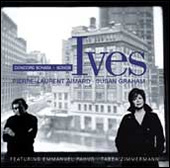 Susan
Graham (mezzo-soprano) & Pierre-Laurent Aimard (piano) [17
songs] (Warner Classics 2564 60297-2, coupled with Second
Piano Sonata, "Concord" performed by Aimard)
Susan
Graham (mezzo-soprano) & Pierre-Laurent Aimard (piano) [17
songs] (Warner Classics 2564 60297-2, coupled with Second
Piano Sonata, "Concord" performed by Aimard)
This is a fine recital. Susan Graham has a lovely, rich voice, and Aimard is true collaborator. In fact, the piano is featured prominently enough that these performances often feel like duets, rather than the more traditional "singer with piano accompaniment." Very much like the reading of the "Concord" coupled with this disc, Graham and Aimard bring a unique interpretive viewpoint to many of these songs. For example, their version of "Songs My Mother Taught Me" is immensely slow and completely free of sentimentality. I've never heard any other version like it. Susan Graham is captivating in "From 'The Swimmers'." She puts her formidable vocal instrument on display in this craggy song. Listen carefully also to Aimard in "The Housatonic at Stockbridge," especially in the shimmering final moments of the song. This is transcedent pianism. But I think the best song on this disc is the last one, "Farewell to the Land." It's otherworldly and beautiful, a great interpretation. This disc may not erase memories of another mezzo-soprano, Jan DeGaetani, who also recorded thirteeen of of these seventeen songs. But Graham and Aimard have made a recording that takes little for granted. Check it out.
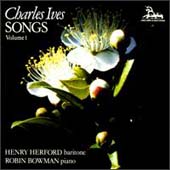 Henry
Herford (baritone) & Robin Bowman (piano) / "Charles Ives Songs,
Vol. 1" [27 songs] (Unicorn-Kanchana DKPCD 9111, out of print)
Henry
Herford (baritone) & Robin Bowman (piano) / "Charles Ives Songs,
Vol. 1" [27 songs] (Unicorn-Kanchana DKPCD 9111, out of print)
I didn't hear this recital until after I'd heard Herford's largely disappointing second volume of Ives' songs. The performances on this disc surprised me. The performances are much more fully realized--and much more convincing. I especially like Herford's versions of "West London" and "The Indians." On the other hand, I still find some of the songs to be less than completely successful. Often, his voice sounds a bit too self-regarding to fully realize some of the more informal elements in Ives' songs. For example, his version of "The Circus Band" doesn't quite come off. In any case, this recording is out of print and difficult to find. Hard-core fans of Ives' songs will want to track it down, but others can turn to Finley or Sharp for other fine baritone singer who are much more readily available.
 Victoria
Villamil; Sheila Schonbrun (sopranos) & Joel Sachs; Cheryl Seltzer
(directors) / The Continuum Ensemble / "A Continuum Portrait 3: Charles
Ives" [6 songs] (Naxos 8.559194)
Victoria
Villamil; Sheila Schonbrun (sopranos) & Joel Sachs; Cheryl Seltzer
(directors) / The Continuum Ensemble / "A Continuum Portrait 3: Charles
Ives" [6 songs] (Naxos 8.559194)
This recording includes:
- The Housatonic at Stockbridge (Villamil)
- Soliloquy (Villamil)
- On the Antipodes (Villamil)
- Sunrise (Schonbrun)
- Remembrance (Schonbrun)
- Aeschylus and Sophocles (Villamil and Schonbrun)
- Three Quarter Tone Pieces and Five Take Offs
- Other works for chamber ensemble
This disc begins with three songs performed by soprano Victoria Villamil. Her version of "The Housatonic at Stockbridge" is very fine, even if it does not erase memories of other fine recordings by Jan DeGaetani and Roberta Alexander. I especially like Villamil's reading of "On the Antipodes." I can only imagine how difficult it must be to sing this thorny piece, but she pulls it off convincingly. It's also pleasing to hear the ensemble join the voice and piano as the song reaches its climax. Soprano Sheila Schonbrun does an excellent job of evoking the otherworldly quality of dawn, just before the sun crests the horizon, in "Sunrise," one of last compositions that Ives ever completed. She also sings beautifully in "Remembrance," Ives elegiac piece dedicated to his father's memory. This is probably the most conventionally melodious piece on the disc, although it clocks in at barely more than one minute. In contrast, "Aeschylus and Sophocles" finds both sopranos singing a piece that seems to come from the same strange and forbidding place as Berg's Wozzeck.
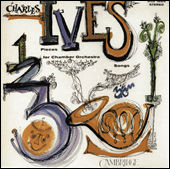 Corrine
Curry (soprano) / "Charles Ives: Pieces for Chamber Orchestra / Songs"
[8 songs] (Cambridge CRS 1804, out of print) This recording includes:
Corrine
Curry (soprano) / "Charles Ives: Pieces for Chamber Orchestra / Songs"
[8 songs] (Cambridge CRS 1804, out of print) This recording includes:
- Eight songs by Corrine Curry
- "The Three Page Sonata" by Luise Vosgerchian
- Eight short works for chamber orchestra
Corrine Curry does a very fine job with the eight songs that she essays. Even if these recordings don't erase memories of other favorite singers, her interpretations are interesting and idiomatic. Curry takes on everything from the straight lieder of "Ich grolle Nicht" to the shouting declamations of "An Election," but she manages to pull everything off with panache. Her version of "General Booth" holds nothing back. Even if you might hope for a more of rough-edged voice in this song, I found myself convinced by Curry's committed performance.
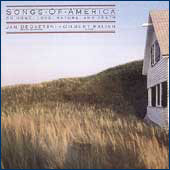 Jan
DeGaetani (mezzo-soprano) & Gilbert Kalish (piano) / "Songs of America"
[2 songs] (Nonesuch ZK 79178, coupled with songs by American composers)
Jan
DeGaetani (mezzo-soprano) & Gilbert Kalish (piano) / "Songs of America"
[2 songs] (Nonesuch ZK 79178, coupled with songs by American composers)
This recording only includes two songs by Ives: "Song (She is Not Fair)" and "Sunrise." But these songs--and the whole album--are so interesting that I thought I'd include this recording in the survey. According to the liner notes, "Sunrise" has the distinction of being the final work that Ives ever composed. He completed it in 1926.
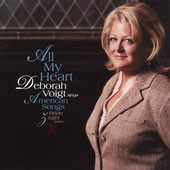 Deborah
Voigt (soprano) & Brian Zeger (piano) / "All My Heart: Deborah
Voigt Sings American Songs" [7 songs] (Angel 7243 5 57964 2
4, coupled with songs by Bernstein, Ben Moore, Griffes, and Beach)
Deborah
Voigt (soprano) & Brian Zeger (piano) / "All My Heart: Deborah
Voigt Sings American Songs" [7 songs] (Angel 7243 5 57964 2
4, coupled with songs by Bernstein, Ben Moore, Griffes, and Beach)
Deborah Voigt has glorious voice. She's one of the foremost, if not the foremost, Wagner-Strauss sopranos of our day. But can she escape from her German, high-art background and sing Ives' songs, which place very different demands on a singer? To my ears, the answer is a qualified "yes." These are not be the most idiomatic of interpretations. (Sometimes it sounds as she's having to rein in her powerful voice, and the tempos aren't as flexible as they could be.) Nonetheless, these seven songs are convincing on their own terms. For example, her version of "Berceuse" is very compelling. Plus, it's fun to hear a world-renowned singer take on Ives' songs--even if she doesn't quite wring out that last drop of feeling. This isn't an ideal introduction to Ives' songs (nor is it intended to be), but it's definitely worth investigating.
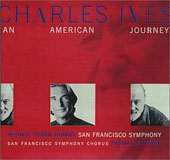 Thomas
Hampson (baritone) & Michael Tilson Thomas (piano & conductor)
/ The San Francisco Symphony, The San Francisco Symphony Chorus / "An
American Journey" [7 orchestral songs] (RCA 09026-63703-2,
coupled with other works by Ives)
Thomas
Hampson (baritone) & Michael Tilson Thomas (piano & conductor)
/ The San Francisco Symphony, The San Francisco Symphony Chorus / "An
American Journey" [7 orchestral songs] (RCA 09026-63703-2,
coupled with other works by Ives)
Hampson is one of the most highly-respected singers in the world. Tilson Thomas is a masterful conductor of Ives' music. Not surprisingly, the disc has received glowing reviews, with special accolades showered on Hampson's performances of the songs. So it's odd that I haven't enjoyed this disc more. What are my gripes? Well, let's examine them song-by-song:
- On "The Things Our Fathers Loved" Hampson sounds self-conscious to my ears. His performance also lacks the penetrating inward gaze that DeGaetani brings to her performance of the same song.
- On "Charlie Rutlage" Hampson sounds hammy. His accent seems forced and unnatural. Also, the orchestral accompaniment doesn't add anything to the song. Compare MTT's orchestral accompaniment with Warren Jones' jaunty then crashing pianism (Argo), and you'll see why I prefer piano to orchestral accompaniment.
- David del Tredici's arrangement of "In Flanders Fields" is colorful and interesting. But it doesn't sound especially Ivesian. More like Korngold; something very Hollywood-ish.
- I don't have nearly as much to gripe about with John Adams' arrangement of "Serenity." The song is a natural fit for Adams with its proto-minimalist quality. But I think that Adams misses the essence of the song at the end. Compare Adams' ending with Kalish's pianism on the Nonesuch CD. Kalish conveys an "unfolding," an escape from time. With Adams, it just stops. (To be fair to Adams, most other recordings don't capture it as well as Kalish either.)
- Hampson is fine on "Serenity." But I don't find him as believable or natural-sounding as Mary Ann Hart or DeGaetani. (Isn't he over-enunciating?)
- One critic that I read drew special attention to Hampson's New York City-accent cry of "Curtain" between "Memories," parts A and B. The critic really liked it. I really don't. I just don't believe it. Again, it sounds forced to me.
- That leaves us with "General Booth." This is very well done. It's worth getting this recording for this single work.
So, there you are. Perhaps I'm over-rationalizing the disc's faults because I should like it. But I still haven't warmed up to it. Maybe I just don't like Hampson's singing when it comes to Ives. Hmmm. Give it a listen for yourself to find out what you think.
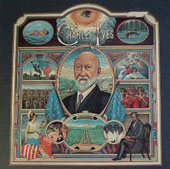 Helen
Boatwright (soprano) & John Kirkpatrick (piano); Thomas Stewart (baritone)
& Alan Mandel (piano) / "Charles Ives: The 100th Anniversary"
[25 songs] (Columbia Masterworks M4 32504; the 5-LP set includes other
works by Ives, out of print)
Helen
Boatwright (soprano) & John Kirkpatrick (piano); Thomas Stewart (baritone)
& Alan Mandel (piano) / "Charles Ives: The 100th Anniversary"
[25 songs] (Columbia Masterworks M4 32504; the 5-LP set includes other
works by Ives, out of print)
All but one of these songs are performed by Helen Boatwright and John Kirkpatrick. [The exception is "In Flanders Fields," which is excerpted from the album "American Scenes, American Poets" (Columbia Masterworks M-30229.)] This is Boatwright's second recital of Ives' songs. Her pioneering recordings of Ives' songs from 1954 (originally issued on the Overtone label; now issued on CRI) are extraordinary. Unfortunately, I think that Boatwright's songs on the "Charles Ives: 100th Anniversary" set are somewhat less impressive--though they have grown on me with repeated listenings. I suppose her voice was past its prime by the time that these recordings were made. If you're an Ives fan, you'll want to track down this set from Ives' centenary year regardless. Several of the other performances in the set are exceptional.
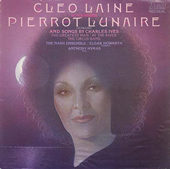 Cleo
Laine (voice) & Anthony Hymas (piano) / "Cleo Laine Sings Schoenberg's
Pierrot Lunaire and Songs by Charles Ives" [3 songs]
(RCA Red Seal LRL1 5058, out of print LP)
Cleo
Laine (voice) & Anthony Hymas (piano) / "Cleo Laine Sings Schoenberg's
Pierrot Lunaire and Songs by Charles Ives" [3 songs]
(RCA Red Seal LRL1 5058, out of print LP)
A bit of trivia about this LP: It was nominated for a Grammy in 1974, making Laine the first (and only?) person to have been nominated for a Grammy in the jazz, pop, and classical categories. Along with Schoenberg's Pierrot Lunaire, Laine essays "The Greatest Man," and "The Circus Band," and Ives' arrangement of "Shall We Gather at the River." All three songs are good, but "The Circus Band" is the most interesting one. Given Laine's jazzy, theatrical approach to singing, it seems like the best match between singer and song. [The Nash Ensemble and Elgar Howarth (conductor) accompany Laine in the Schoenberg's work.]
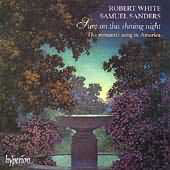 Robert
White (tenor) & Samuel Sanders (piano) / "Sure on This Shining
Night: The Romantic Song in America" [2 songs] (Hyperion CDA66920,
coupled with songs by American composers)
Robert
White (tenor) & Samuel Sanders (piano) / "Sure on This Shining
Night: The Romantic Song in America" [2 songs] (Hyperion CDA66920,
coupled with songs by American composers)
Only two of Ives' songs here, among a recital of 28. This is pretty good, but nothing earth-shattering. White has a pleasant, strong tenor voice, and he seems to relish singing "The Side-Show."
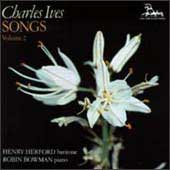 Henry
Herford (baritone) & Robin Bowman (piano) / "Charles Ives Songs,
Vol. 2" [31 songs] (Unicorn-Kanchana DKPCD9112, out of print)
Henry
Herford (baritone) & Robin Bowman (piano) / "Charles Ives Songs,
Vol. 2" [31 songs] (Unicorn-Kanchana DKPCD9112, out of print)
Strangely, after Herford's successful first volume of Ives' songs, this second volume seems to fall flat. On many of the songs, Herford and Bowman seem to lack a firm interpretive viewpoint, so the results end up being dull. Herford's voice is fine--so long as you don't mind a bit of vibrato--but he fails to invest these songs with the passion and perspective that they require. In many cases, he seems to blindly charge through a song where others find nuance and meaning. Again, I don't mean to imply that all of the songs are poorly performed. For example, Herford's reading of "Maple Leaves" is fine, as is his "From the Incantation." But more often than not, he seemed underpowered, and the performers lack the rollicking, expressive quality that you find in the best versions of these songs. Compare Herford and Bowman's pallid interpretation of "Charlie Rutlage" with Ramey's, Stewart's or Sperry's, and you'll quickly see what I mean.
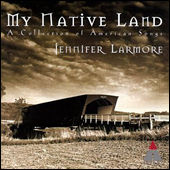 Jennifer
Larmore (mezzo-soprano) & Antoine Palloc (piano) / "My Native
Land: A Collection of American Songs" [2.5 songs] (Teldec
0630-16069-2, coupled with songs by American composers)
Jennifer
Larmore (mezzo-soprano) & Antoine Palloc (piano) / "My Native
Land: A Collection of American Songs" [2.5 songs] (Teldec
0630-16069-2, coupled with songs by American composers)
Like Deborah Voigt, Larmore is very successful in the world of opera. But the demands that Ives' songs place on a singer are very different, and in some regards, the very qualities that make you successful as a operatic diva render you less successful with songs--especially Ives' songs. I think that's what happened here. Unlike Voigt, Larmore does not seem to make the necessary adjustments. To my ears, these songs sound over-emoted and over-cooked. (Plus, she only records the first half of "Memories"! What's that all about?)
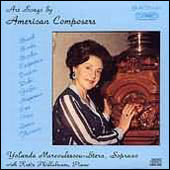 Yolanda
Marcoulescou-Stern (soprano) & Katja Phillabaum (piano) / "Art
Songs by American Composers" [3 songs] (Gasparo GSCD-287,
coupled with songs by American composers)
Yolanda
Marcoulescou-Stern (soprano) & Katja Phillabaum (piano) / "Art
Songs by American Composers" [3 songs] (Gasparo GSCD-287,
coupled with songs by American composers)
Marcoulescou-Stern approach to Ives' songs doesn't appeal to me. Her voice is very formal and her diction is stilted. She also has an accent that renders her English unidiomatic.
I'm Not Sure Where to Put This Next Recording, So I Guess I'll Stick it Here...
Is it songs? Is it chamber music? Is it classical? Is it jazz? And most importantly, is it any good?
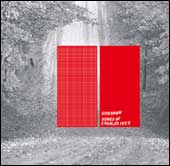 "Sideshow"
(Matt Moran, vibraphone; Adam Good, electric guitar; John Hollanbeck,
drums & percussion; Oscar Noriega, alto saxophone & bass clarinet)
"The Songs of Charles Ives" (CRI Blue Shift CD 2000)
"Sideshow"
(Matt Moran, vibraphone; Adam Good, electric guitar; John Hollanbeck,
drums & percussion; Oscar Noriega, alto saxophone & bass clarinet)
"The Songs of Charles Ives" (CRI Blue Shift CD 2000)
When I heard about this disc, I was very excited about it. I'd read somewhere about a jazz quartet called "Sideshow," which was taking the songs of Charles Ives and performing them in a jazz context. I'd hoped that it might be an interesting hybrid of genres; something like what the pianist Uri Caine has done with Mahler's music, a meaningful intregration of two approaches to music that still maintained the spirit of the composer. I love Ives and I love jazz, and Ives' willingness to allow for improvisation--to be content with a something less than a completely "finished product"--certainly lends itself to jazz.
So I'm sad to report that my overall impression of this disc is that it's...deadly dull. These guys have managed to drain all of the energy and vitality from these songs. Where's the raucous, pungent Ives that I love?! Not here. It just sounds sort of watery and diluted to me--and that's the "uptempo" pieces. All of the sharp edges seem to have been worn off. Where's the glorious rough edges, the dissonance, the rhythm, the life?
Other Recordings
Other recordings of Ives' songs include:
- Dietrich Fischer-Dieskau (baritone) & Michael Ponti (piano) / from the "Dietrich Fischer-Dieskau Edition" [19 songs] (Deutsche Grammophon 4635142, coupled with songs by Ravel and Debussy, available in the U.K.)
- Thomas Hampson (baritone) & Armen Guzelimian (piano) / "Songs by American Composers" [8 songs] (Teldec 4509988252, out of print, coupled with songs by Copland and Griffes)
- Michael Ingham (voice) & Henry Brant (piano) / "Henry Brant Plays, Michael Ingham Sings Charles Ives" [28 songs] (AmCam Records ACR 10306)
- Veronica Lenz-Kuhn (soprano) & Tan Crone (piano) [36 songs] (Thorofon CTH 2406, available in the U.K.)
- Yolanda Marcoulescou-Stern (soprano) & Jeffrey Peterson (piano) / "The Art of Yolanda Marcoulescou-Stern, Volume 2" [5 songs] (Gasparo GG3-1005, 3 CDs, coupled with works by various other composers)
- William Parker (baritone) & Dalton Baldwin (piano) / "An Old Song Resung" [8 songs] (New World Records 80463, coupled with works by other American composers)
- Carolyn Watkinson (mezzo-soprano) & Tan Crone (piano) [5 songs] (Etcetera ETC 1007, out of print)
- Dawn Upshaw (soprano) & Orchestra of St. Luke's, John Adams (conductor) / "American Elegies" [5 songs] (Nonesuch 79249, coupled with "The Unanswered Question" and works by other American composers)
Back to Top | Back
to Survey of Recordings | Notes About These
Works
Original text copyright © Scott Mortensen 2002-2006